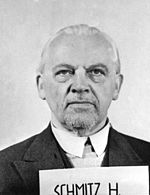Hermann Schmitz, Date of Birth, Place of Birth, Date of Death
TweetHermann Schmitz
German businessman, CEO of IG Farben, BIS board memberAbout Hermann Schmitz
- Hermann Schmitz (1 January 1881 – 8 October 1960) was a German industrialist and Nazi war criminal.
- CEO of IG Farben from 1935 to 1945, he was sentenced to four years in prison in the IG Farben Trial. Schmitz was born in Hessen on 1 January 1881, son of factory worker Diedrich Schmitz and Luise Wöhrmann.
- In 1898 he began studying at Ahrenbergische Aktiengesellschaft für Bergbau und Hüttenbetrieb in Hessen, and in 1905 he entered the Commerce College in Nuremberg.
- After completing his studies, he was hired by Metallurgische Gesellschaft (metallurgy company), where after some time he became consultant of Wilhelm Merton, member of the superivosors' council of the company, who helped Schmitz promote his career. In 1914 he was required to serve in the army.
- He was injured during the First World War and, after recovering from his injuries, he was made Reich's supervisor for chemical products production in the matériel department (1915). In 1919, as an expert in fertilizers and nitric salts, he took part in the assembly that negotiated the Treaty of Versailles.
- There he met Carl Bosch, a chemist of worldwide fame.
- In July 1919 Schmitz was hired at BASF by Bosch as his financial advisor.
- He was promoted to administrator of BASF's exterior department, a position he maintained after the company became part of IG Farben.
- As per his job requirements he maintained contacts with large businesses, such as Standard Oil, with which he took part in negotiations, always having the support of that era's governments in the interests of IG Farben.
Read more at Wikipedia


 Date of Birth:
Date of Birth:  Place of Birth: Essen, North Rhine-Westphalia, Germany
Place of Birth: Essen, North Rhine-Westphalia, Germany